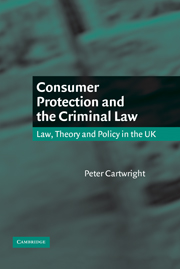Book contents
- Frontmatter
- Contents
- Preface
- Acknowledgements
- List of abbreviations
- 1 Consumer protection rationales
- 2 Techniques of regulation
- 3 The role of criminal sanctions in consumer protection
- 4 The use of the criminal law
- 5 Consumers and safety: the protection of physical integrity
- 6 The protection of economic interests
- 7 The enforcement of regulatory consumer law
- 8 Conclusions
- Index
8 - Conclusions
Published online by Cambridge University Press: 24 June 2009
- Frontmatter
- Contents
- Preface
- Acknowledgements
- List of abbreviations
- 1 Consumer protection rationales
- 2 Techniques of regulation
- 3 The role of criminal sanctions in consumer protection
- 4 The use of the criminal law
- 5 Consumers and safety: the protection of physical integrity
- 6 The protection of economic interests
- 7 The enforcement of regulatory consumer law
- 8 Conclusions
- Index
Summary
Criminal sanction are freqently used to protect consumers from business wrongdoing. Whether the objective of the provision is to protect the consumer's health and safety, or her economic interests, the criminal law is central. This is not to say that other legal techniques will have no useful role to play. The law of contract provides a mechanism by which consumers' expectations can be protected and their bargains held sacred. Increasingly, it also has a say in the fairness and content of consumer transactions. But contract law suffers from certain inherent limitations that make it an insufficient means of protection. Transaction costs, in particular enforcement costs, may be prohibitive, and so the consumer's redress on paper may look more effective than his redress in practice. The doctrine of privity frequently prohibits non-contracting parties from benefiting from a contract, and remains an obstacle to redress in many cases. The law of tort may overcome some of the limitations of contract, for example, the privity requirement, but has little effect where the consumer suffers pure economic loss, and is again limited by the existence of transaction costs. Other legal techniques have important roles to play too, such as administrative controls and self-regulation. But it is the criminal law to which successive governments have looked to provide a means for protecting consumers from business malpractice.
Despite, or perhaps because of, the ubiquitous nature of criminal sanctions, criticism of them has been vocal.
- Type
- Chapter
- Information
- Consumer Protection and the Criminal LawLaw, Theory, and Policy in the UK, pp. 244 - 249Publisher: Cambridge University PressPrint publication year: 2001



